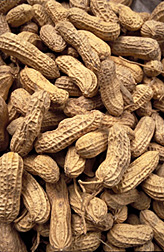|

Peanuts. Photo courtesy of USDA.
|
|

|
New Research Presented on Peanut Components
By Rosalie Marion
Bliss June 30, 2008
Fat free peanut flour, whole peanuts and peanut oil all may have
cardio-protective properties, results from a new animal study suggest.
Agricultural Research Service (ARS)
scientists are presenting the findings at this week's
Institute of Food Technologists 2008
Annual Meeting in New Orleans, La.
For the study, male hamsters were randomly divided into four groups.
Each group of nearly 20 hamsters was fed one of four different diets, all of
which were high-fat and high-cholesterol.
Each diet consisted of nearly equal percentages of fats, carbohydrates
and proteins. For three of the four test diets, equivalent amounts of food
component were substituted with fat-free peanut flour, peanut oil or peanuts
without skins. The fourth diet contained no peanut product and served as the
control group.
After the hamsters had been on the test diets for six months, the
researchers tested their blood lipid chemistry. Compared to hamsters in the
no-peanut control group, those in each of the three peanut groups were found to
have significantly lower total cholesterol and LDL "bad" cholesterol. Also
positive, HDL "good" cholesterol levels held steady.
Other blood chemistry research has been published that links reduced
heart disease risk factors in humans with consuming peanut butter and peanut
oil, but this is the first animal study to exhibit such an effect from
consuming the fat-free portion of peanuts. While it is still unknown if the
effect would translate to humans, the unit’s confirmatory and additional
research studies with peanut components are ongoing.
The study was conducted by
Tim
Sanders, who heads the ARS
Market
Quality and Handling Research Unit, in Raleigh, N.C., and Amanda Stephens,
a food science and nutrition graduate student at North Carolina State
University (NC State), in Raleigh.
Stephens is participating in a cooperative program with ARS in which
students gain course credit through laboratory training and experience. The ARS
study was conducted in NC State facilities under an Institutional Animal Care
and Use Committee approved protocol.
ARS is a scientific research agency of the
U.S. Department of Agriculture.